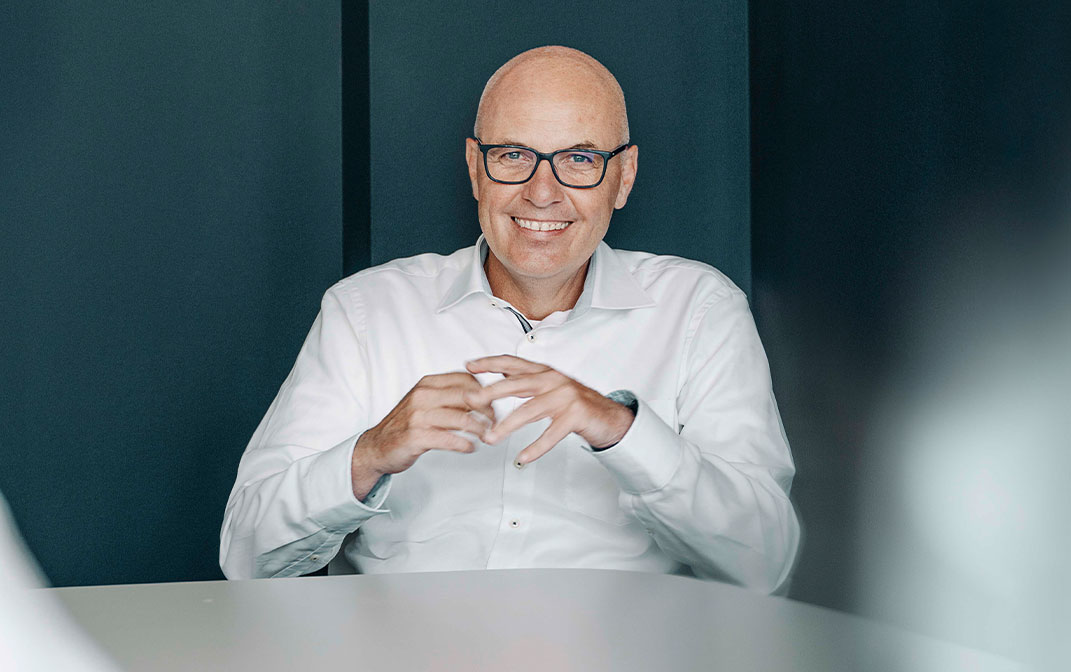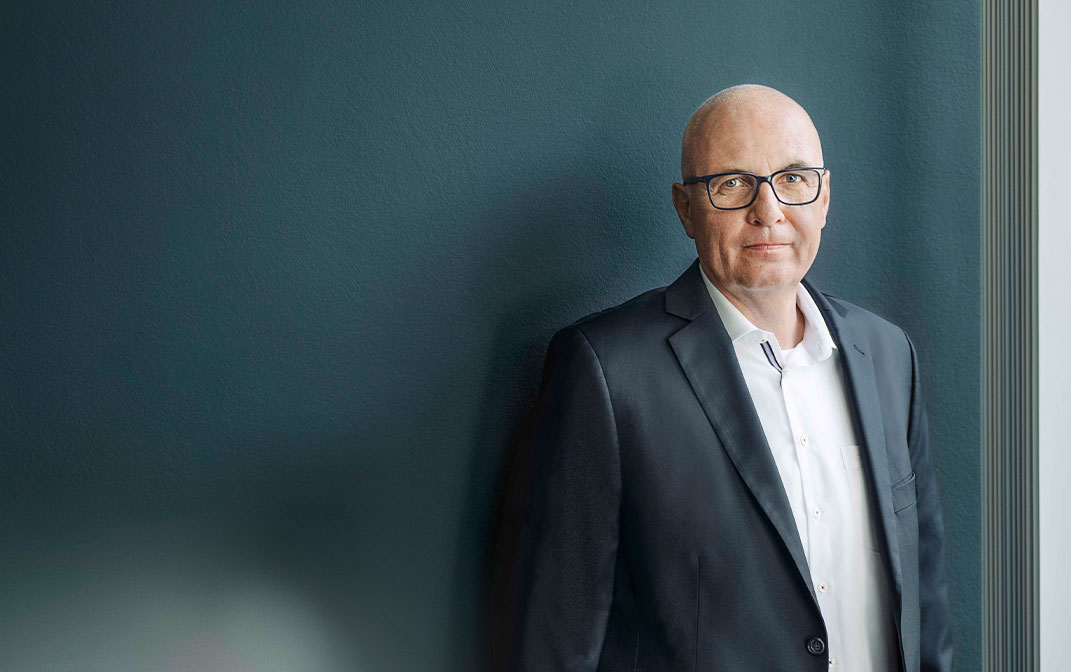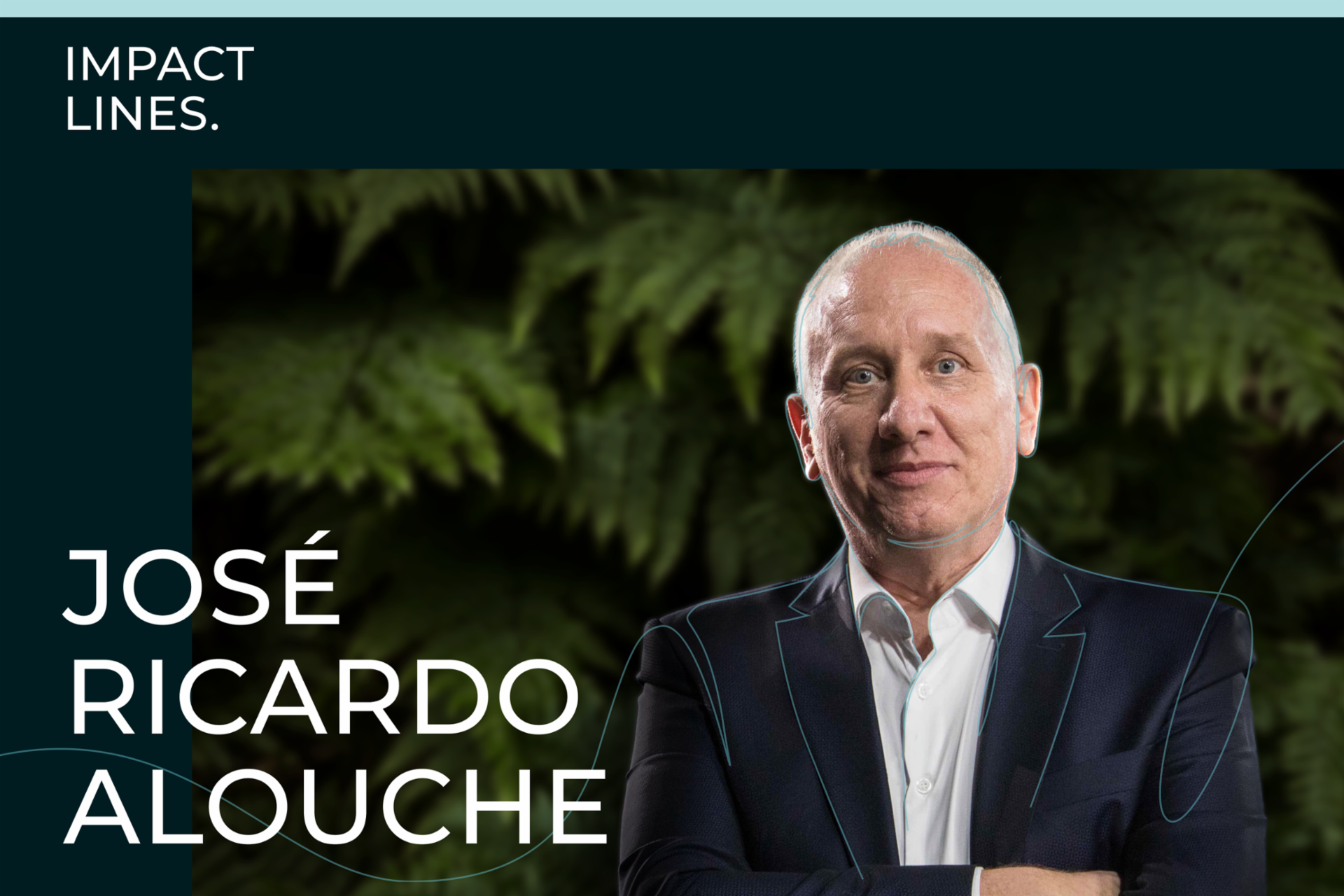Matthias Gründler has headed the TRATON GROUP since July 2020, taking up his role as CEO at a time characterized by change. Scania, MAN, Volkswagen Caminhões e Ônibus, and (in the near future) Navistar work on delivering sustainable, electric, and automated transportation under the TRATON umbrella. This opens up technical opportunities that would have been inconceivable a few years ago. In this interview, Matthias Gründler offers an outlook.
The TRATON GROUP is aiming to become a Global Champion in the commercial vehicle industry. How significant is the acquisition of US manufacturer Navistar in this respect?
Matthias Gründler: We developed our Global Champion Strategy around six years ago, based on an analysis that showed that we are strong in Europe and South America, but barely represented in the key markets of North America and Asia. With this in mind, we wanted to position ourselves differently on the global stage — primarily with regard to the US, where around 35% of the profits in the industry worldwide are created. The goal was a more international focus for our growth and a reduction in our dependence on the European and South American markets. With the integration of Navistar in mid-2021, we’re on track to achieve this. And we’re already really enjoying our collaboration with our new colleagues in the US.
“At the heart of our new strategy is the big question for the future: how can we pave the way for electrification and autonomous driving?”Matthias Gründler
CEO of TRATON SE
But now you need a new strategy.
MG: That’s right, and we’re working on it right now. Just a few years ago, important topics such as all-electric, battery-powered transportation or the automation of commercial vehicles were still an abstract vision of the future. Now, they are moving within reach. The integration of Navistar means we can tick our Global Champion Strategy off and start a new chapter in our Company’s history. That new chapter is devoted to our strategy in Asia — but the issue at its heart, the big question for the future, is how we can pave the way for electrification and autonomous driving, and how these will impact the logistics sector and therefore our customers.
How do you plan to drive forward the integration of the Scania, MAN, Volkswagen Caminhões e Ônibus, and Navistar brands under the umbrella of the TRATON GROUP — and what added value will be generated as a result?
MG: We already had a joint purchasing venture with Navistar and will now integrate purchasing fully. I see a lot of additional potential here, for example through the further expansion of centrally controlled collaboration in purchasing, also known as lead buying. However, when we look at all the brands, including Scania, MAN, and Volkswagen Caminhões e Ônibus, we realize that leveraging economies of scale — say with shared components — often also increases costs due to the high degree of complexity, so that on balance, there’s not much left over. Our new strategy will therefore be to focus on selected systems and do a really good job of integrating them, rather than trying to integrate as many components as possible.
Like electrification?
MG: Precisely. We can start from scratch there, so the complexity is relatively low. We can fully exploit economies of scale by using uniform systems across all brands, for example with the common central drive, the electric drive axle, or with collective enclosure modules for battery systems. We will invest around €1.6 billion in electric mobility by 2025 and develop a comprehensive modular toolkit for electric vehicles that will be used throughout the Group. The brands can then decide for themselves how they make the best use of these modular toolkits.
“The biggest task is to establish a powerful, cross-border rapid-charging infrastructure for long-haul transportation by 2025.”
Where do you see the greatest challenge in helping electric mobility achieve the breakthrough in commercial vehicles?
MG: The biggest task is to establish a powerful, cross-border rapid-charging infrastructure by 2025 so that the step toward electrifying long-haul transportation can be successful. This requires an enormous collective effort on the part of industry and policymakers, and we need to make a start on this here and now. In addition, we have to drive the life-cycle costs of an electric truck down below those of a diesel truck as quickly as possible. Otherwise, most of our customers will continue to opt for fossil fuel-powered vehicles. For this to happen as quickly as possible, not only are high-quality electric vehicles needed, like those we are developing under the umbrella of the TRATON GROUP, but also corresponding state subsidy programs. And finally, we believe supporting measures are also required. We need a CO2-based truck toll, a higher CO2 price, and a reduction in the cost of electric power for our customers. This way, we can provide a cost benefit to transportation companies that operate electrified vehicles. We have to do this together, including in collaboration with the German Association of the Automotive Industry (VDA) and the European Automobile Manufacturers’ Association (ACEA).

In conversation with Matthias Gründler, who has been CEO of TRATON SE since 2020.
“We need a CO2-based truck toll, a higher CO2 price, and a reduction in the cost of electric power for our customers.”
Electric trucks can be battery-operated, but they can also be powered by a fuel cell. Where do you stand on hydrogen?
MG: By now, our position on hydrogen is clear. Batteries have advanced enormously in the past ten years in terms of technology, weight, and price. So we are convinced that the future of trucks is electric. Electric trucks get their operating power directly from a battery. This scenario enables all-electric, long-distance transportation with heavy-duty trucks, such as freight haulage. The prerequisite for this is the powerful rapid-charging infrastructure I already mentioned, so that the 45-minute rest times drivers are obliged to take by law after being on the road for 4.5 hours can be used directly for recharging.
How are you so certain of this?
MG: The trucks in our brands provide us with meaningful data about how the vehicles are used under real conditions. We have analyzed this data, and the result is that the possibilities afforded by battery technology already cover the lion’s share of the usage scenarios in heavy-duty long-haul transportation. And that’s even without taking into account the technical enhancement that can be expected here — for example, solid-state batteries with significantly higher energy density.
But batteries will likely never achieve the energy density of hydrogen.
MG: That’s true. Still, trucks and buses powered by hydrogen and fuel cells have a significant disadvantage compared with battery electric commercial vehicles. Only 25% of the primary energy reaches the wheel when electricity is converted to hydrogen and back; the remaining 75% is lost. The ratio is the opposite with battery electric trucks: in this case, three quarters of the electricity that can be generated renewably by a wind turbine, for example, can be used directly to power a vehicle engine. So we need to consider carefully which technology path gets the required infrastructure first. The poor efficiency of hydrogen will only be overcome when the renewable energies have been developed accordingly and green hydrogen is available in large quantities. Even then, however, in many cases the pure battery-powered electric drive will be the better alternative both ecologically and economically. There will be individual use cases for hydrogen-powered engines, such as long-distance journeys in remote areas where the required charging infrastructure is simply not available.
“With battery electric trucks, three quarters of the electricity that can be generated renewably by a wind turbine can be used directly to power a vehicle engine.”
What role do diesel engines still play?
MG: In the transition period — that is, until there is a comprehensive network of rapid-charging stations — we need highly efficient diesel-powered engines so that the smallest amount of CO2 possible is emitted. That’s why we developed the CBE: our Group-wide 13-liter engine, which Scania will launch on the market soon. The other brands will follow. The powertrain is highly fuel-efficient. During the transition period, diesel and electric powertrains will co-exist. That’s why we also design our models to suit both drive concepts — at least wherever this is possible and makes sense.
How important are partnerships in your view, for example with Hino or — in the case of autonomous driving — with AI expert TuSimple?
MG: We have a highly successful joint purchasing venture with Hino as well as an excellent exchange of knowledge on the topic of hydrogen and fuel cells. That’s a good thing, since we want to keep an eye on this technology together with Hino. For me, the partnership with TuSimple is of special strategic importance. Together, Scania and TuSimple are already road-testing two self-driving vehicles that operate in real hub-to-hub mode. We are learning a lot right now and will be developing further prototype vehicles with MAN and Navistar. Autonomous and electrically powered commercial vehicles based on artificial intelligence can provide a solution for the shortage of human drivers in transportation and thus help overcome a major problem for our customers. However, they also offer the TRATON GROUP completely new opportunities to expand its services for hauling companies and fleet operators. Not only will we produce commercial vehicles in the future, we will support the entire transportation process with our expertise.

Matthias Gründler
Matthias Gründler has been Chief Executive Officer (CEO) of TRATON SE since July 16, 2020. Born in Stuttgart in 1965, Gründler trained as an industrial management assistant and completed a degree in business administration. He began his professional career in 1986 at Daimler AG. Gründler was named Chief Financial Officer (CFO) at Mitsubishi Fuso in Japan in 2008 and three years later took over management of the Powertrain Procurement and Business Development unit at Daimler Trucks & Buses. He served as CFO of the company from 2012 to 2015 before taking over as CFO of Volkswagen Truck & Bus GmbH (today: TRATON SE) in September 2015.




.jpg/jcr:content/Teaser-Grafik-Tiva-Sharifi-3840x2560-V1-(1).jpg
)
.jpg/jcr:content/Teaser-Grafik-Mansoureh-3840x2560-V1-(1).jpg
)
